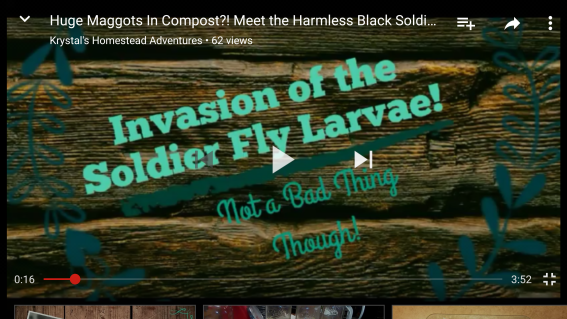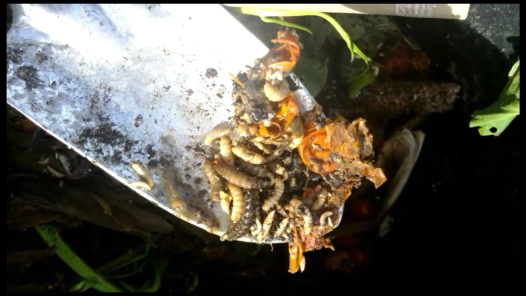 So, you go outside with plans to check out your compost pile, like any other regular day on the homestead. Perhaps you’re adding some garden fresh veggie scraps from last night’s delicious oven roasted chicken recipe; or maybe you just shredded a ton of junk mail from the last two weeks, and you’re ready to recycle it back into the earth. You make your way to your pile to turn it, and grab your shovel. As you pull up a large shovel full of your unprocessed compost, you unearth something that makes you stumble back a foot or two in surprise: hundreds, no THOUSANDS, of squirming, unbelievably large maggots fighting to dig down further into the compost as they escape the burning rays of the sun!
So, you go outside with plans to check out your compost pile, like any other regular day on the homestead. Perhaps you’re adding some garden fresh veggie scraps from last night’s delicious oven roasted chicken recipe; or maybe you just shredded a ton of junk mail from the last two weeks, and you’re ready to recycle it back into the earth. You make your way to your pile to turn it, and grab your shovel. As you pull up a large shovel full of your unprocessed compost, you unearth something that makes you stumble back a foot or two in surprise: hundreds, no THOUSANDS, of squirming, unbelievably large maggots fighting to dig down further into the compost as they escape the burning rays of the sun!
This isn’t exactly something the new composting homesteaders are used to witnessing; but I assure you, I’m about to calm those squeamish feelings you might have!
Why Are Maggots In My Compost?
Many members of the fly families have a larval stage similar to that of the grotesque common housefly (or worse, the bottle fly). They are attracted to rotting material, and the females are always quick to seek this rotting matter out and deposit their eggs. In a matter of a day or two, there are maggots everywhere! Compost is no exception, as the rotting matter draws the attention of species that aid in the decomposition of food and other wastes. The Black Soldier Fly, however, is not the bad guy like the common fly is! Yo might actually come to ENJOY their presence, for many reasons!
Will Black Soldier Fly Larvae Hurt My Compost? Do Black Soldier Flies Spread Disease or Harm Humans/Animals Like Houseflies?
Black Soldier Flies and their larvae are 100% harmless! The only thing they will do to your compost is process it VERY quickly. You will also be left with a lot less compost, as the BSFL will eat most of it; leaving you with as little as 5% of the original volume. However, what IS left will be incredibly nutritious for your plants, and will be a GREAT amendment for existing soil. The “tea”, or liquid excrement that the BSFL and composter creates is also excellent for plants. But this tea will need to be diluted 1:20 in water. Otherwise, you might shock and burn your plants!
Black Soldier Fly Larvae do not spread disease, as a matter of fact, it is believed that they have an antibacterial excretion when they are close to pupating, which is a natural defense for the larval stage. Therefore, they do not carry disease into adulthood. Adult BSF’s do not eat, therefore they will not bite people or animals!
Will Black Soldier Flies Harm My Garden or Potted Plants?
Absolutely not! Since the larvae will only eat dead or decaying matter and the adults do not eat, there is absolutely no risk of your plants becoming lunch for these insects! As a matter of fact, they might even draw predatory insects or animals into your garden (such as birds, frogs, or moles) that will eat harmful pests. You can rest easy knowing that your plants are safe. As a matter of fact, the BSFL poop and compost tea that they produce will actually benefit your plants; in essence, they are a beneficial insect. Even if indirectly.
What Should I Do with Black Soldier Fly Larvae If I Want to Remove Them from My Compost?
If you truly don’t want these little critters in your compost, feed them to your chickens! Your chickens will LOVE you for it. They are a high protein, safe, disease free, nutritious, fun, and prolific snack! Some homesteads even use them as a large percentage of their chickens’ feed. It’s not a bad idea at all!
If your chickens can’t eat them all, try rinsing them and dehydrating them! You could dehydrate them in the summer sun, perhaps after giving them a quick boil. Since these larvae are not known for spreading disease, a quick rinsing should do the trick. Once they are dehydrated, you can store them in jars or bags with silica packets, and store them away for winter. With the lack of insect life during the cold months, you will be doing your hens a huge favor by saving those black soldier fly larvae for winter snacking.




